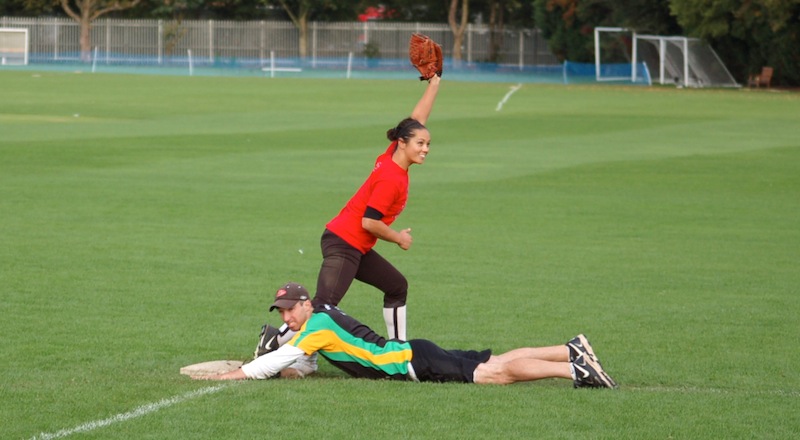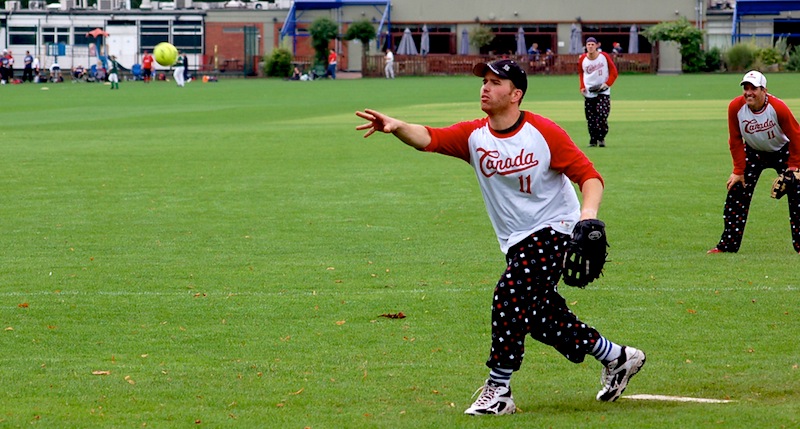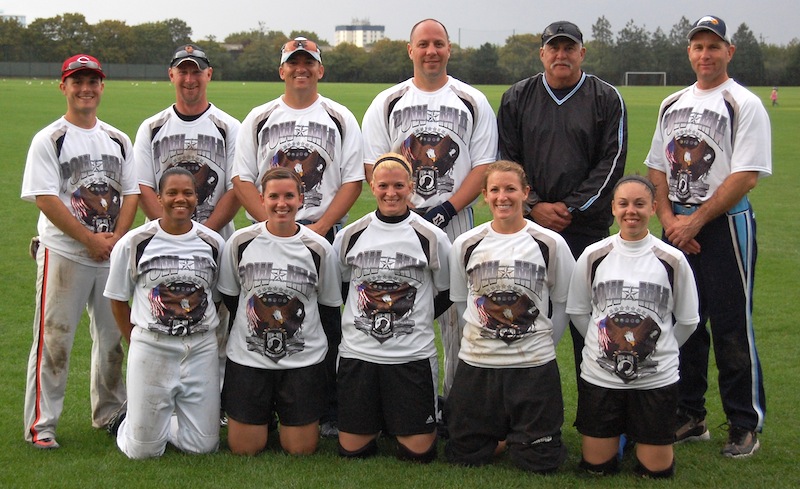by Bob Fromer
Over the past few years, the Softball World Series tournament has become just a little bit predictable. Most of the 18 teams are the same from year to year, and within a range of two or three places, you can usually guess where most of them will finish -- or at least whether they will be competing in in Trophy, Plate or Cup competitions when the tournament splits into three levels on Sunday.
But this year's World Series, played under scudding clouds but thankfully very little rain at the BA Concorde Club in Cranford, West London on September 10-11, was gloriously different.
The lowly rose up to smite some of the bigger teams down. Some of the form teams stumbled at their final hurdle. Shock results came in throughout both days. And on a weekend dominated (at least in the British and American media) by remembrances of 9/11, it may have been fitting that two American teams contested the final and -- in true American fashion -- it was home run power that decided the outcome.
The contestants
In terms of overseas participation, the 13th Softball World Series welcomed a new team from Switzerland and welcomed back a Belgian team after a year's absence as well as the now ever-present Bebe's Kidz, a US military team from Germany. There were the usual three teams from the Emerald Isle -- the Irish National Team, Munster and the Craicers. But Jersey and Guernsey were absent.
The overseas contingent is likely to increase next year, as teams from Slovenia and Austria have already expressed interest in the 2012 event, and hopefully Guernsey and/or Jersey will come back.
Domestically, there was a new student team made up of university players, and they joined the World Series regulars: England, GB Masters, GB Development and Scotland, and the ex-pat teams representing the USA, Canada, Africa, Australia/New Zealand, Japan/Asia and South America.
The South American team had a distinct lack of South Americans, however, and is likely to be replaced next year by the the Welsh, who turned up with a banner on Sunday to signal their intent.
Finally, back for the second time, there was last year's winner, a US military team from RAF Lakenheath known then as the Lakenheath Eagles and now as MIA-POW.
The name may have changed but the result was the same: the team took the main trophy back up the M11 with them when they headed for Suffolk.
But that result, like much of the rest of the tournament, was not necessarily predictable as events unfolded.
Canada re-born
The surprise of the weekend was certainly Canada. The idea for a Softball World Series had come from a Canadian (former Channel 5 MLB presenter Todd Macklin), and Canada had mounted a serious challenge for the first year or two when the event was held in Watford. But ever since then, the Canadians had been more about turning up in silly costumes, drinking their way through the event and finishing down near the bottom.
The silly costumes hadn't altogether gone away this year, as the team appeared wearing pyjama bottoms emblazoned with maple leaves, and they lost their first game on Saturday by 9-8 to the GB Development Team. All that was par for the course.
But then, for the rest of Saturday, the Canadians just kept winning, and they claimed two very notable scalps, edging past the Anzacs, last year's beaten finalists, by a score of 7-6 and then hammering a very strong England team 21-12. Come the end of the day, Canada were top of Round-Robin Group B.
Even more importantly, thanks to their loss to Canada and a thumping by England, the Anzacs finished third in the group and were condemned to the Plate competition on Sunday.
More surprises
But the Canadians weren't the only team making waves.
In Group C, the GB Masters, who normally wind up in the Plate competition, were suddenly showing that the wisdom of (relative) old age can sometimes equal wins -- helped by one or two players to whom the term "Masters" would be hard to apply.
They finished Saturday on 4-1, as did Africa, and in this group it was Ireland, who came third last year, who unexpectedly found themselves in the Plate competition, along with the traditionally underachieving Americans from Germany, Bebe's Kidz.
In Group A, it was no shock that MIA-POW, who won the World Series last year as the Lakenheath Eagles, went through to the Trophy competition on Sunday with a 4-1 record. Instead, the surprise in this group was USA, the American ex-pat team, who last won the World Series in 2005 and have often struggled to stay in the Trophy competition since.
Not this time. A really strong US line-up swept through Group A undefeated, including an 11-10 win over MIA-POW. But this rivalry had only just begun.
Sunday
The World Series always begins with 18 teams divided into three round-robin groups of six, with each group containing high, low and middle seeds based on the previous year's results plus a bit of guesswork.
But after Saturday, the top two teams in each group go to the Trophy competition, the middle two teams to the Plate and the bottom two teams in each group to the Cup.
And the first thing that happens Sunday, in each of those three competitions, is two round-robin groups of three teams, with the top two from each group advancing to Page Playoffs.
Trophy Round-Robin
In the Trophy competition, the three teams that had looked most impressive on Saturday were USA, MIA-POW and England. So no one raised an eyebrow when the USA and England advanced to the Page Playoffs from Group 1 at the expense of an African team whose glory days (four wins in five years from 2000 through 2004) seem ever farther behind them, even if their African drums are still the same.
But Group 2 -- with MIA-POW and the two surprise packages, Canada and GB Masters, was a different story. GB Masters beat Canada, then lost to MIA-POW and all eyes were on the Canada game against the Lakenheath team. Had the Canadian bubble burst, or did they have another big win in them?
It really looked like they did. Canada built up a large lead and held it for most of the game. But MIA-POW came back and there were several twists and turns before the contest ended 13-all. And that sent MIA-POW and the GB Masters through and left Canada with the dubious consolation of playing Africa for fifth place.
Plate Round-Robin
The Plate Round-Robin was a real dogfight, because it contained six teams -- Scotland, GB Development and Bebe's Kidz in Group 1 and the Anzacs, Munster and Ireland in Group 2 -- that had all been more accustomed to the Trophy competition in recent years.
GB Development clung on for a 12-10 win over Scotland and then rolled over a squabbling Bebe's Kidz team 14-2 to top Group 1, with Scotland joining them in the Page Playoff.
Even though Munster held the Anzacs to a 2-2 draw in Group 2, they lost the grudge match against Ireland by 14-8, and so the Anzacs and Ireland advanced to the Page Playoff.
Cup Round-Robin
In the Cup Round-Robin, with everyone capable of beating everyone else, all the games were close.
In Group 1, a tie between the Craicers and Japan, a one-run win by Studentenland (the university team) over Japan and a two-run win by the Craicers over the Students put the Craicers and Studentenland through to the Page Playoff.
In Group 2, South America, who had scrambled all tournament for women players, suddenly came good and beat both the Swiss and the Belgians to top the group. A first-ever meeting between a Swiss and a Belgian team in slowpitch competition would decide who joined South America in the Page Playoff, and the Swiss prevailed after a real struggle, 15-13.
So the stage was set for the Page Playoff denouements in all three sections of the World Series.
Cup Competition
In the Cup Page Playoff, the Craicers beat South America in the 1 v 2 game and went straight to the Final, while the Swiss eliminated the Students in the 3 v 4 game by 13-5.
South America and the Swiss then met to see who would join the Craicers in the Final, and South America won by 9-4, leaving the Swiss to finish a very creditable third in the Cup (15th overall) in their first venture into the slowpitch heartlands on this side of La Manche.
So the Craicers and South America met in the Final, and this time it wasn't a contest. The Craicers took the Cup with a 20-2 mauling of the ersatz South Americans.
Japan beat the Belgians 10-8 in the game to decide fifth and sixth place.
Plate Competition
Having the Anzacs in the Plate Page Playoff was like throwing a cougar into a cage of meerkats.
In the 1 v 2 game, Anzacs won comfortably by 11-5 over a talented but relatively inexperienced GB Development Team, then sat back to see if GB Development could get back to the Final.
As it turned out, they could.
Scotland beat Ireland 9-1 in the 3 v 4 game, then Scotland threw away the game against GB Development, blowing a lead before losing 15-13 and finishing third (ninth overall).
So GB Development had another go at the Anzacs, and it didn't go any better than the first time. The Anzacs took the Plate with a 16-9 victory.
Bebe's Kidz finally got their act together and beat Munster 6-4 in the game to decide fifth and sixth place.
Trophy Competition
In the top competition, the Trophy Page Playoff featured the three teams that had looked strongest throughout the tournament -- USA, MIA-POW and England -- plus the GB Masters. Surely the GB Masters had gone as far as they could go.
But first it was USA against MIA-POW in the 1 v 2 game, and this was probably the game of the tournament. It went to extra innings, and featured a nine-run inning by MIA-POW that changed a comfortable US lead into a three-run deficit. But USA tied the game to force an extra inning played under tiebreak rules, and though MIA-POW scored twice in the top of the frame, USA came back to score three and won a 17-16 thriller.
The two teams had met twice and both times USA had won by one run. Would they meet again in the Final...?
The 3 v 4 game was GB Masters v England, and everyone expected the England win that would set up a game with MIA-POW to decide who went to the Final. But the GB Masters had other ideas, banged out a big early lead and withstood a late England comeback that fell way short at 22-14. So England finished fourth.
"They all crushed the ball," said England's Jake Palmer afterwards, "and we didn't hit at all. It didn't matter how far back we played -- they still hit it over our heads."
So it was now GB Masters against MIA-POW to play USA in the Final, but the GB Masters really had shot their bolt. The Lakenheath team won 19-2, and the GB Masters had to settle for third place in the tournament -- a result they probably never believed they'd achieve.
Africa claimed fifth place with a 9-7 win over the deflated Canadians.
The Final
After those two one-run thrillers between the USA and MIA-POW, it may have been overly optimistic to expect more of the same.
But the Final was pretty tight for the first four innings, even if USA appeared to have the edge.
MIA-POW scored only once in the top of the first inning, but it was a harbinger of things to come: a long solo home run by Keith Serrano that bisected the outfielders up the middle.
The USA countered with four in the bottom of the first on three straight hits by Duncan Waugh, Chiya Louie and Mike Povolones, and then an RBI double by Nate Sumpter, an RBI single by Emily Gouge and a final RBI on a groundout by Derek Carpenter.
MIA-POW cut the lead to 4-2 in the top of the second, and again it was a long solo home run by Eugene "Doc" Rivers. They tied the game in the top of the third when the Americans, a great defensive team all weekend, suddenly made a couple of errors and took a 5-4 lead in the top of the fourth on consecutive singles by Doc Rivers, Nancy Duchanas and Jon Mabie.
But the game swung back towards the USA in the bottom of the fourth when four more runs were delivered by the bottom half of the order. Consecutive singles by Carly Isaacs, pitcher Kevin Quincey and Courtney Buchanan were the key blows and the US now held an 8-5 lead.
Power prevails
So far, the Final had been a pretty standard affair, played by two good teams in front of the usual large World Series crowd, but in steadily worsening conditions, with a shower followed by darkening clouds that reduced the field to a grey gloom.
But no one was prepared for the power explosion that took place in the top of the fifth and sixth innings and swung the game irrevocably towards MIA-POW.
The old Baltimore Orioles manager Earl Weaver built his teams in the 70s and 80s around pitching and the three-run homer. Here, the pitching was kind of irrelevant, but MIA-POW fired off two three-run homers in the top of the fifth and another in the top of the sixth, all of them huge line drives that split the outfielders in left-centre field and two of them belted by the Final MVP Timothy "TK" Kellner.
Those three home runs put nine runs on the scoreboard for MIA-POW, and USA didn't have an answer. They scored only one run in the last three innings, and their only real chance to get back in the game came in the bottom of the sixth when they had the bases loaded, two outs and Mike Povolones at the plate.
Mike hit the ball very hard, but his NSL teammate on the Pioneers, Vanessa Goodman, made a fine catch of the line drive in deep right field, and the US was done.
The final score was 15-9, and 11 of those 15 MIA-POW runs were driven in by home runs. Who needs fences...?
Men v Women
On Saturday evening, the World Series featured a special exhibition game between handpicked teams of women and men, organised by GB Development Squad players Areej Elmaazi and Belinda Alker to raise money for the GB Slowpitch Team programme.
A large number of people stayed to watch the game, intrigued by the question of whether a team of really good women players could get the better of a very good men's team.
We all know that co-ed teams with the best female players usually win, but that's not the same thing as saying that the women are as good or better than men in absolute terms. There are issues of strength, power and speed and that's what came into play during the exhibition game.
The Women's Team played a really excellent game, both on offense and defense -- and lost 19-3. The Women had ten hits in seven innings, all but one of them singles. The exception was a triple by Chiya Louie.
The Men had 24 hits, and ten of them were for extra bases, including five home runs -- two by Chris Yoxall and one each from Neil Sylvester, Nate Sumpter and Neil Wardrope.
And that's really all you need to know. The game was played in great spirit, the crowd enjoyed it and hopefully a lot of money was raised. But if the women ever want to do this again, they should line up a men's team of players that are more like Bobby Riggs, rather than taking on Steve Hazard, Kenny Pregnell, Nate Sumpter, Mike Povolones, Chris Yoxall, Ed Watkinson and their ilk.
World Series Results
Final Trophy Standings
1 - MIA-POW
2 - USA
3 - GB Masters
4 - England
5 - Africa
6 - Canada
Final Plate Standings
7 - Anzacs
8 - GB Development Team
9 - Scotland
10 - Ireland
11 - Bebe's Kidz (Germany)
12 - Munster
Final Cup Standings
13 - Craicers
14 - South America
15 - Swiss Team
16 - Studentenland
17 - Japan/Asia
18 - The Cage (Belgium)
World Series Winners
1999 – England
2000 – Africa
2001 – Africa
2002 – USA
2003 – Africa
2004 – Africa
2005 – USA
2006 – Rest of the World
2007 – Anzacs
2008 – Anzacs
2009 – England
2010 - Lakenheath Eagles
2011 - MIA-POW



